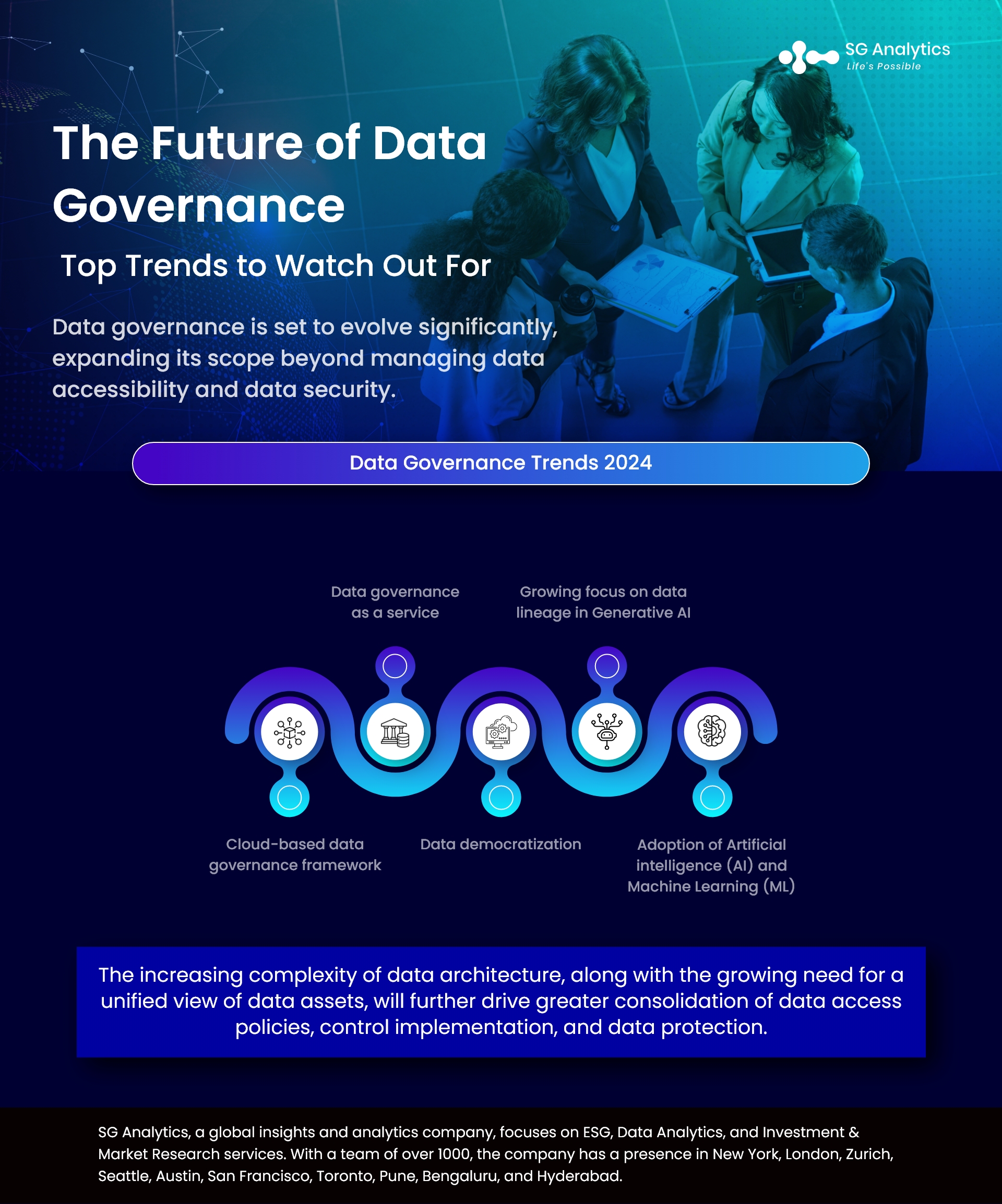In 2024, organizations are likely to face a complex landscape encompassing data compliance and enablement. Organizations will increasingly turn to data governance frameworks to navigate this environment and outsource different governance activities. These emerging trends also promise to offer organizations a better data governance experience at a reasonable cost.
Organizations are determined to enhance their data governance programs, the foundation that supports harmonized data activities. The drive for functioning data governance stems from an interest in the return on investment (ROI) upon and following implementation. Investors are also showing a growing interest in how companies govern their data.
The Evolution of Data Governance
The most valuable commodity of any organization is that data is useful when managed properly. For most companies, data governance is becoming a need-to-have for various reasons:
- The advancement in GDPR and other compliance measures that put data security under intense scrutiny;
- The increased technological prowess of bad players seeking access to proprietary data;
- The proliferation of data usage across the organization, as more and more teams require data access in their work;
- Increasingly complex and distributed data architecture and data management.
To integrate these overarching data governance initiatives, organizations will have to identify and execute suggested approaches across different business units. By applying their preferred data governance frameworks, organizations can further conduct best practice assessments for allocating resources and determining what is feasible. They can also conduct data audits to connect data governance outcomes to their organization's profitability. This will help in determining whether the data is critical enough to fall under current data governance practices.
As data continues to become more central to business insights, data governance measures are emerging as a critical need for data-driven organizations to keep data secure, accurate, and updated. With the growing access to data and more regulations, organizations are working on preparing strong strategies to shape the future of data governance.
Read more: 2024 Outlook: The Future of AI in Customer Engagement

Data Governance Trends 2024
In 2024, data governance is set to evolve significantly, expanding its scope beyond managing data accessibility and data security. Data Governance will involve implementing data frameworks that contribute to an organization’s market integrity and economic performance. Organizations need to update and inspect their data governance strategy and policies. Let's explore some of the top data governance trends and predictions for 2024 to stay ahead of the curve.
-
Cloud-based Data Governance Framework
Data governance is becoming an all-company problem that is no longer relegated to disparate silos of the business. With data governance technologies growing more intelligent, organizations are integrating strategies to effectively maintain the availability, usability, and security of data.
Owing to this, cloud-based data governance is emerging as a trend that is set to have a marked impact on how organizations ensure data compliance and discovery. Modern data warehouses and data lakes empower multiple divisions across companies to access and use data without needing to tap the data engineering team for help. As data input channels and tech stacks are becoming more complex and prolific, the manual approach to data governance isn’t scalable. Organizations are quick at finding and incorporating an agile approach to data governance.
With a growing number of companies leveraging cloud-based, distributed data architectures like data mesh, a comprehensive and flexible cloud-based data governance framework will enable them to manage their data effectively.
Read more: Navigating the Future of Technology Compliance with Blockchain and Data Privacy
-
Data Governance as a Service
Data governance is not just a standalone tool or workflow, it is a complex set of people, processes, and tools that combine to give an organization better control over its data. Multiple tools and technologies work in harmony in service of an overarching data governance strategy.
Today, data governance as a service is an emerging new trend that helps with the proliferation of third-party providers and enables organizations to manage their data effectively. With a strong data governance strategy, organizations can:
- Classify and map their existing data
- Store their data with a cloud-based platform that syncs with automated tools
- Conduct data observability to ensure the data is accurate and trustworthy
- Create a data governance model, mission statements, responsibilities, and accountability structures
With data governance becoming the front-of-mind for every organization, leveraging a growing number of tools and services can assist in making instituting data governance strategies easier and scalable.
-
Adoption of AI and ML
Today, AI and machine learning are becoming prevalent technologies across numerous industries. They are being used in data governance as well. The growing integration of artificial intelligence and machine learning frameworks is set to continue in 2024 and become more widespread in data governance along with other key business processes.
Artificial intelligence and machine learning present numerous benefits for data governance, allowing policies to be implemented efficiently and effectively. AI and machine learning enable organizations to quickly identify anomalies and inconsistencies in their data. These systems can detect data errors and improve the accuracy and reliability of data.
AI and machine learning are becoming very useful for data mapping and pattern recognition and for automating the data discovery process. In the data governance sense, artificial intelligence and machine learning are equipping organizations to detect and prevent data breaches.
Read more: A Deep Dive into Data Governance Frameworks

-
Data Democratization
Data democratization is emerging as a popular concept in data-driven organizations. With data democratization in place, data becomes more accessible and usable for all. With data democratization, users can make data-driven decisions and generate insights without having to rely on the data team.
A prominent trend in data democratization is self-service analytics. It allows users to make requests and get feedback without the need to have extensive technical expertise. Data discovery platforms help enable self-service analytics, making data discovery an easy task. However, it’s critical to consider the data governance implications of data democratization. With more users having the ability to access data easily, it can be of great efficiency and effectiveness, but it will also require strict access management protocols. Data governance policies must be implemented to ensure data is being used responsibly.
Data democratization is emerging as an important trend that can enable organizations to unlock the full potential of their data. By making data accessible to all, organizations can drive innovation as well as stay ahead of the competition.
-
Growing Focus on Data Lineage in Generative AI
With the adoption of GenAI becoming more integrated across different industries and applications, organizations are equipping themselves with the ability to trace the journey of data from its origin to its ultimate use in AI models. This enhanced focus on data lineage aids in preemptive error detection and plays a vital role in post-hoc analysis.
This shift towards more sophisticated and proactive data governance frameworks will enable organizations to understand the flow and usage of data across the GenAI framework. This will be essential for operational success and regulatory compliance. With data engineering teams ditching manual data governance processes and integrating automated cloud-based data governance tools, teams can yield better and more reliable results.
Read more: Data Management Framework: Importance, Critical Components, and Examples

Looking Forward
In today's data-driven world, strong data governance strategies are enhancing as well as making it easier to use, discover, and apply data to identify unlimited possibilities.
Data governance is expected to grow beyond policies and procedures into a comprehensive framework that will help define the details and act on data. This tendency will result in a continuous process detailing systems for guiding analyses of data activities and priorities for data decision-making to assess organizational progress.
In 2024, fundamental building blocks for these data governance frameworks will further continue to include data, roles, processes, metrics, and tools. And determining the appropriate level of support from each piece will impact the effectiveness of data governance. Owing to this reason, more and more organizations will consider adopting a data governance framework to determine effectiveness, ensuring proper data management and accountability.
Data governance will continue to gain momentum in 2024 and beyond. However, the increasing complexity of data architecture, along with the growing need for a unified view of data assets, will further drive greater consolidation of data access policies, implementing controls, and protecting data. With this concentration, data governance frameworks will become more intricate with AI-driven tools, enabling organizations to enforce data-driven policies.
SG Analytics (SGA) is a global data solutions firm that harnesses data with purpose across the data value chain - from origination, aggregation, management, modernization, and analytics to insights generation to create powerful business outcomes for its customers. Through its research and data analytics consulting services, SGA marries content with context to provide bespoke solutions to its customers, enabling them to improve efficiency, scale, and grow. The company has a presence in New York, London, Zurich, Seattle, Austin, San Francisco, Toronto, Pune, Bangalore, Hyderabad and Wroclaw. The firm serves customers across the banking, financial services and insurance (BFSI), technology, media and entertainment (M&E), and healthcare sectors, amongst others, including Fortune 500 companies.
A leading enterprise in Data Analytics, SG Analytics focuses on leveraging data management solutions, analytics, and data science to help businesses across industries discover new insights and craft tailored growth strategies. Contact us today to make critical data-driven decisions, prompting accelerated business expansion and breakthrough performance.
About SG Analytics
SG Analytics (SGA) is a global data solutions firm that harnesses data with purpose across the data value chain - from origination, aggregation, management, modernization, and analytics to insights generation to create powerful business outcomes for its customers. Through its research and data analytics consulting services, SGA marries content with context to provide bespoke solutions to its customers, enabling them to improve efficiency, scale, and grow. The company has a presence in New York, London, Zurich, Seattle, Austin, San Francisco, Toronto, Pune, Bangalore, Hyderabad and Wroclaw. The firm serves customers across the banking, financial services and insurance (BFSI), technology, media and entertainment (M&E), and healthcare sectors, amongst others, including Fortune 500 companies.
Apart from being recognized by reputed firms such as Analytics India Magazine, Everest Group, and ISG, SG Analytics has been recently awarded as the top ESG consultancy of the year 2022 and Idea Awards 2023 by Entrepreneur India in the “Best Use of Data” category.









